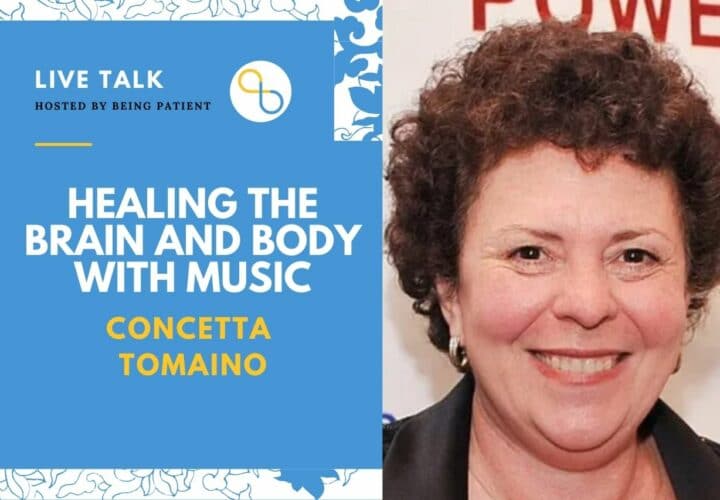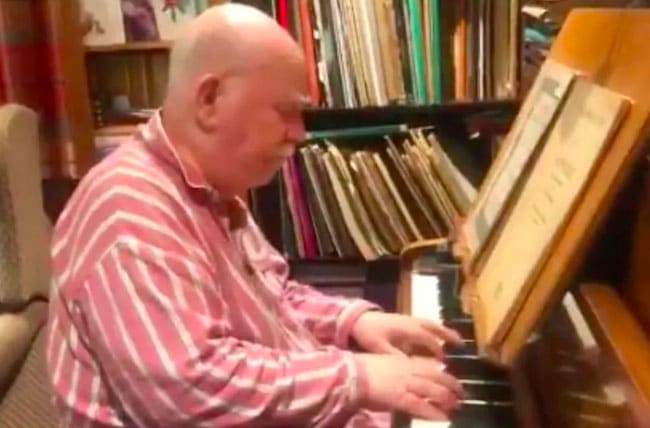In Wisconsin Alzheimer’s Institute’s Amazing Grace Chorus, caregivers and people living with dementia share community, a love of music, and a message of hope.
Music can be transformative, particularly for those living with Alzheimer’s. For starters, studies show it can improve memory and mood for those with dementia. As the Wisconsin Alzheimer’s Institute’s Amazing Grace Chorus has found, its benefits extend well beyond brain science.
As a singing group of people living with dementia and their care partners, The Amazing Grace Chorus is part of a growing movement of “memory choirs.” Through musical expression, social engagement, and access to resources, its members seek to improve the quality of life of individuals and their care partners and focuses on stigma reduction in the community.
Amazing Grace Chorus Senior Outreach Program Coordinator Stephanie Houston, Chorus member Steve Mays, his wife Heidi Mays, and care partner Daniel Johnson joined Being Patient Live Talk to share their experience with this impactful choir. Watch the full conversation, or read a transcript from the conversation below.
Being Patient: How did The Amazing Grace Chorus come about?
Stephanie Houston: We were so fortunate. Dr. Mary Mittelman, who is a researcher at New York University, reached out to the founder of the Wisconsin Alzheimer’s Institute back between 2012 and 2013. Dr. Mittleman had begun her own chorus called The Unforgettables, a chorus for people living with dementia at NYU Langone’s Alzheimer’s Disease and Related Dementias Family Support Program. She began her chorus back in 2011, and her research was focusing on how she could create an activity where people who are living with dementia could participate along with their caregivers. She had received additional funding, and she was looking to also be able to adapt and create other choruses around the country.
She knew about Dr. Mark Sager’s work with the Wisconsin Alzheimer’s Institute, and she found out that there was a regional Milwaukee office that did specific outreach in the African American community. So, she reached out to Dr. Sager, and then we had an opportunity. In 2014, we traveled to New York City to see The Unforgettables chorus she produced. So, she was able to provide us with a structure in regard to developing a chorus. We were able to really shape and build our chorus, based on the needs of our community here in Milwaukee.
Our chorus, as a part of rehearsals and singing, would love to sing the song “Amazing Grace.” Mr. Willie Wade would sing that song, and there would not be a dry eye in the place. It was our director, our Milwaukee office director, who said, you know, maybe we should call the chorus “The Amazing Grace Chorus,” and that’s how we got the name. There’s more to the story, but that’s how we started.
Being Patient: That’s amazing. I can imagine it must be such a joyous occasion when you all get together and bring joy to other people. Dan, earlier, you said your wife was diagnosed quite a while ago. What did this chorus mean to you and your wife?
Dan Johnson: I don’t think I can overstate the importance of it. It’s just been wonderful and one of the activities that Barbara and I have really enjoyed. The deeper she seemed to get into her Alzheimer’s journey, the more important it became to us. Our singing or my singing with her would animate her really and bring her out in ways that almost no other activity could.
“The deeper she seemed to get into her Alzheimer’s
journey, the more important it became to us.”
We found out about The Amazing Grace Chorus through a mutual friend of Steve. Then we showed up around 2018. I think I said to Stephanie, Casey, and some of the other leaders, “Well, we’re kind of here to try this out, and I’m not sure it’s gonna work.” We were awfully busy, and I didn’t know if we could fit it in. I had all sorts of other excuses, but after just a couple of months, I think we both realized not only was this a wonderful experience for us, but we really began to feel the sense of family— in connecting and being with The Amazing Grace Chorus, and with all of its leaders and members in the chorus. So, it’s just been a godsend for us, truly.
Being Patient: Heidi and Steve, I want to hear your perspective. What has the impact of this choir been for you?
Heidi Mays: I actually do not participate yet, but the reason why is I was caring for my mother, my elderly mother, now she just passed a year ago. So, I’m still trying to come out of the grieving period for that. Like Steve, I’ve really felt all the love and support from the members and the staff there. We made a few notes yesterday, and Steve feels it’s just one big happy family in that everyone supports one another. The thought came to him yesterday about comparing the choir to a casserole, all the different voices that blend together into the final result. He said that it didn’t matter what your skill level is. The choir is all-inclusive with no judgments. Steve, do you want to talk about sitting next to Dan?
Steve Mays: He’s family, you know, and he also has a solo. Sitting next to someone with the solo, you know, it’s a rush. He has a great voice and everything. Dan’s like my big brother.
Johnson: I thought you were gonna say I was the tuna in the casserole. Brother is better. I’ll go with that.
Being Patient: How often do you get together, and what’s rehearsal like? In addition, where do you perform?
Johnson: Since COVID, finding appropriate performance venues has been difficult. Prior to that, we performed in the Milwaukee area and in a couple of venues in Illinois. We also performed in Madison and some of the other surrounding cities around the Milwaukee area. We would typically perform around six or eight performances. Then, we would practice typically on a Saturday morning for a couple of hours. We have another practice or rehearsal Saturday morning, in fact, and the rehearsals are when we get down to business. Our directors want us to do that, but there’s still a lot of fun and camaraderie. I think that’s where we truly all bond with each other.
Being Patient: I can feel that just by talking to you, that friendship and camaraderie are central to this chorus. It is wonderful to create something like this, where it’s not about Alzheimer’s or dementia. Is that right?
Houston: It really gives the participants such a rich and meaningful shared experience. In our meetings and our chorus rehearsals and sing-alongs, we want to make sure that within, there is no stigma. Everyone knows the purpose of our chorus. Some of the leading principles of our chorus are love for music, love for family, and love for life. It is about improving the quality of life of those who are participating and encouraging those in our community about hope and what, many times for a lot of people, the unexpected. We have a spring and fall season, and our chorus rehearsals usually are up to about 11 weeks, and then we end with a community performance.
“Some of the leading principles of our chorus
are love for music, love for family, and love for life.”
Prior to the pandemic, in 2019, we had about 14 community performances. So, we would rehearse, and then we would go out and spread our message of love and song, and quality of life with the rest of our community. It’s just brilliant to see it in action. And I can’t say enough about the families like Steve and Heidi and Dan and Barbara who come to the chorus. It is such rewarding work, and I can’t say enough about it.
Being Patient: The Amazing Grace Chorus is part of a growing movement of memory choirs. Is there any initiative to have this spread further than where you are in Wisconsin?
Houston: You know, when we began, and with Dr. Mittelman, she was the first, and she began a chorus in upstate New York and also a chorus in Minnesota called Giving Voice. They also received technical assistance for Giving Voice, they have really expanded their reach in providing technical assistance to other choruses.
So, now there are other choruses around the country. In 2019, we had the opportunity to participate in a national campaign with Maria Shriver called the AlzheimHER’s Chorus, and that really featured a lot of the choruses from around the country. So, it has become a chorus movement. It’s so wonderful that other people are creating choruses in their communities as well.
Being Patient: Is there any research that’s being done about the impact of these types of choirs?
Houston: Like I said, Dr. Mittelman has performed her research on her course called The Unforgettables. In addition, we were actually able to present a paper at the Alzheimer’s Disease International Conference in 2018 about the improvements that we saw just among our participants. We saw a 70 percent increase in activity outside of the chorus.
We also saw the improvement in just self-worth and self-esteem increase by 60 percent. So, we know that the benefits of the chorus are just outstanding because it does improve mood and some of the impacts dementia can have on a person, like language. It can add quality of life to the person and their care partners.
Johnson: I agree, and I don’t quite know where to begin. I mean, among other things, we were able to have this shared, fun experience. As you know, and all of us on this call know, when you’re an Alzheimer’s caregiver, fun is something that can be in short supply. It’s a wonderful thing to be able to have an activity with my spouse, who has pretty severe Alzheimer’s at this point, where I didn’t have to be her caregiver, but rather sit next to her, and just both of us feel the joy of singing. It is absolutely wonderful.
Being Patient: For people watching or reading that want to do something like this, do you have a website or information about this type of choir?
Houston: At the Wisconsin Alzheimer’s Institute, we have what is called the Wisconsin Dementia Resource Network. I, as well as two other chorus leaders, did a talk about hybrid choruses. You can find the webinar on the website to learn more about hybrid choirs like ours. On The Amazing Grace Chorus page on the website, they’ll be able to find information about how people can join our chorus, join us online, sing along with us, and a little bit more about us.
In addition, the chorus has started celebrating its eight-year anniversary and kicking off its 2023 spring season “Renew, rebirth, revive!” sessions Saturday, February 18th, with sessions running every Saturday until May 6, 2023. We hope you can join us!
Katy Koop is a writer and theater artist based in Raleigh, NC.



